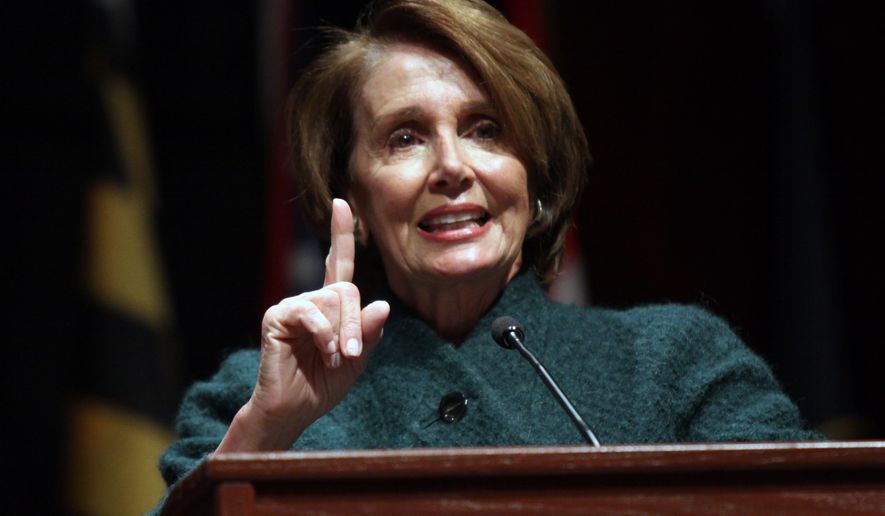House Minority Leader Nancy Pelosi said Tuesday that there is a direct connection between increased federal spending and bigger paychecks for American workers, as she defended the big-government agenda at the heart of President Obama’s budget.
“It’s about bigger paychecks,” Mrs. Pelosi said at a forum hosted by the Brookings Institution, a liberal think tank in Washington.
Mrs. Pelosi, California Democrat, described connections between her party’s budget priorities — increased spending on infrastructure, education, scientific research and health care — and rising wages, economic growth and reduced deficits.
“The reason our economy has not had a full recovery is because of stagnant wages. It bears repeating that, in a consumer economy, it is the middle class that are the job creators,” she said.
Mrs. Pelosi added, “In order to succeed, we must have a healthy respect for the connection between the public and private sectors.”
She also blamed Republicans for causing the Great Recession and warned that the country could enter another economic tailspin if the GOP-run Congress wins the budget battle with President Obama.
“Democrats’ commitment to middle-class economics stands in sharp contrast to the Republicans’ relentless trickle-down agenda — the agenda that drove our economy into a ditch,” she said. “Republicans’ economic agenda included massive, unpaid-for tax cuts for the rich, two unpaid-for wars and a doctrine of no regulation, no supervision of Wall Street. It is this radical agenda that precipitated the financial meltdown and shattered our economy.”
Democratic lawmakers have frequently pinned the blame for the financial meltdown on GOP policies.
House Committee on Financial Services Chairman Jeb Hensarling, Texas Republican, responded to those charges in a speech at the libertarian Cato Institute.
“Their narrative is false,” he said. “First, financial regulation did not decrease in the decade leading up to the crisis; it markedly increased. As the Mercatus Center has noted in some unassailable research, total regulatory restrictions pertaining to the financial services sector grew every single year between 1999 and 2008.”
Still, Mrs. Pelosi said she saw areas where the two parties could find common ground in budget talks, such as infrastructure projects. But when asked during a question-and-answer session about her Republican foes, she couldn’t hide her disdain.
“They don’t believe in governance, they don’t believe in science, and they don’t believe in Barack Obama,” she told the audience.
The forum was part of an aggressive push by Democrats to convince voters that their plan will end the wage stagnation that has plagued the middle class, in part by increasing taxes on the wealthy and corporations to pay for tax breaks and other benefits for middle-class families.
Her remarks echoed recent speeches by Mr. Obama, including the State of the Union, in which he made the case that the recent uptick in the economy allowed for increased government spending, which in turn would accelerate the recovery.
The president Monday presented his $4 trillion budget that included about $74 billion in new spending for the fiscal year and $1 trillion in new taxes over a decade. The Republican-controlled Congress immediately pronounced it dead on arrival, citing opposition to growing the government and raising taxes.
Mrs. Pelosi insisted government spending would ignite innovation and create a ripple effect through the economy.
“Knowing the only way for the American economy to fully recover, we must recognize that the middle class are the real job creators in America,” said Mrs. Pelosi. “In a consumer economy, when workers have the wages and confidence to spend, they generate demand, which in turn creates jobs. It’s about bigger paychecks.”
“We must achieve bigger paychecks, build better infrastructure, invest in education and innovation and manufacture more products here in America,” she said.
• S.A. Miller can be reached at smiller@washingtontimes.com.




Please read our comment policy before commenting.